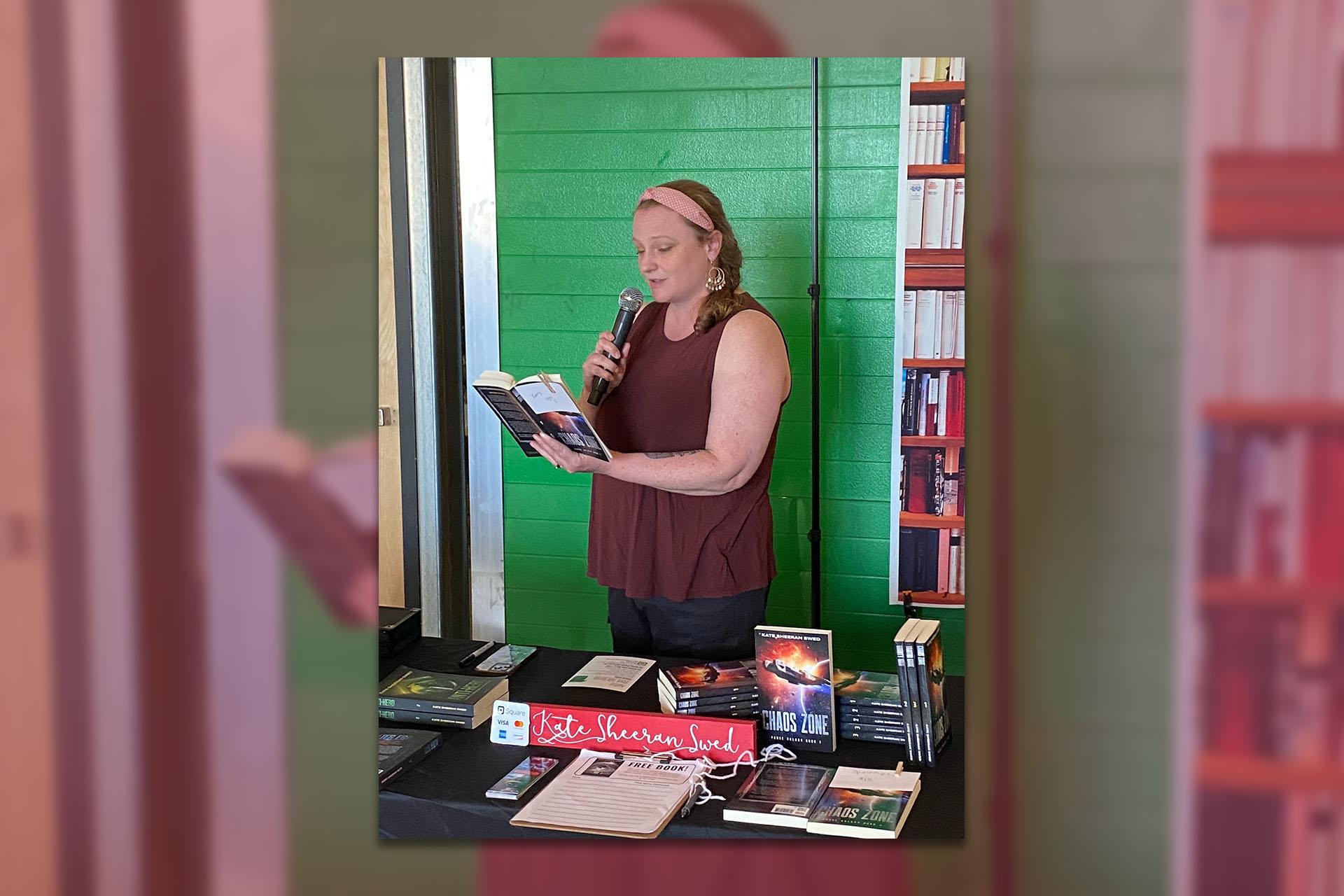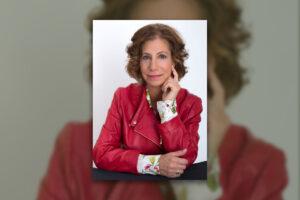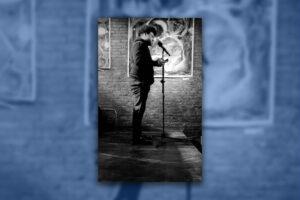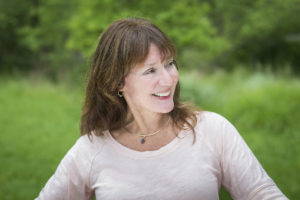Kate Sheeran Swed, a science fiction and dystopian author living in New York’s capital region, met with me to discuss her life as an indie author. In the interview, I had the pleasure of peeking behind the scenes of her writing process and learning about the hurdles she’s had to overcome to become successful in the writing industry.
Tamara Smith: What about science fiction led you to write in the genre?
Kate Sheeran Swed: I grew up reading fantasy books. I liked Lord of the Rings and Wheel of Time. I always thought I’d be a fantasy writer, but I find it difficult to pinpoint the change. I believe it was when I switched to writing about superheroes. I started writing fantasy books but then I thought, “No, I should be serious, I should write serious books.” I was a lot younger at that time and tried to write a literary book. That was when I did my MFA program, and my brain just decided to rebel. It was also around this time when Marvel was really getting big, and I got really excited about how it was building its own universe. However, I wasn’t excited that Black Widow was the only woman, and there were no people of color. Nobody looked like the people I’d interact with in the real world. I wanted to write my own thing that would be like Marvel, but at the same time tell a story I could relate to.
TS: Were any characters in your novels inspired by real life or fictional people?
KS: I don’t think that any of them were based on other characters. I don’t usually based characters on people that I meet or see, though sometimes I like to watch people and their mannerisms, because sometimes those are just things that I notice. I have a hard time remembering that people aren’t just talking heads, and I want to make sure that my characters are actually showing emotions. While watching movies and TV is fine for inspiration, the characters are choreographed. They don’t seem to be an accurate representation of our reality.
TS: In your opinion what makes a great story?
KS: The characters, and a good character change. For example, it’s fine to watch James Bond ‘crash around’ and never change at all, but what makes me remember a story is how a character grew or learned something. Maybe they even have a deep flaw in the beginning of the book that they need to grapple with. For example, they’re very ambitious but they hurt people on their quest for ambition, or they are learning what their place is in the world. I sometimes like to watch and read things that don’t have a happy ending. I like endings where the character doesn’t get what they want, or even what they’re questing for. But overall, a character has to change in order for the story to be great.
TS: What can you say about your world-building process?
KS: I have a bit of tunnel vision when it comes to my world building. I usually have a little premise for the story and then as I am writing it, I let it grow off to the sides. But I don’t sit down and map out every piece of the world. I’m not really looking at things like ‘this is how they read books’ or ‘this is what their language is or how their language evolved’. I usually come up with the central premise and then I let the characters move through the world. To give an example, one of my novels is a retelling of Great Expectations. Miss Havisham is an AI, so she is stuck on a space station and is teaching her daughter to be an assassin instead of a heartbreaker. That was what I knew when I started the story in terms of the world building. Once they moved off the station, that’s when the questions became ‘How do they pay for things?’ ‘Do they have a chip on their wrist or something?’ Is it going to be in the sci-fi trope? Is it going to be something I’m going to really lean into and build and make more interesting, or different than other sci-fi visions. Am I going to do something fans are familiar with or am I going to make it fresh and different from any other story? Other than that, I don’t really plan out or have a process at the beginning; I just build it up as I go.
TS: Do you ever find it difficult to create your settings? Do you ever wonder if your sci-fi worlds are translatable, especially with explaining the technology in these worlds?
KS: Yes, I try to give more of a feeling of it. My spaceships are not extremely detailed. I don’t write hard sci-fi books, so I try not to heavily expand and contradict myself. I’ll draw a layout for the spaceship and think ‘there’s supposed to be a window here’. I’ve learned the hard way in terms of creating my worlds. There are times when even I, the writer, have forgotten some elements to my own worlds.
TS: So, drawing makes it easier for you to translate it to words?
KS: Yes, as well as just trying to get a feeling of it so that my characters always meet in the galley/kitchen area to strategize or to have meetings. I’m just trying to give more of a feeling of the space but it can be hard especially with action scenes. I find those more difficult in terms of thinking of how to pull in the emotion as well as keeping track of what the stations are doing simultaneously.
TS: How do you ensure that your readers stay immersed in your world?
KS: I try not to throw too much description at them. My books are fast paced, so I try to write details that would give a lot of information quickly.
TS: I noticed that below a novel on your website, you write something like ‘readers who enjoy Marie Lou would like these books.’ Are there any other authors that you pull inspiration from?
KS: I love Marie Lou, she’s amazing. A lot of times I’ll go back to books I really loved and read them again. I admire her writing even though it’s not entirely science fiction. I also pull from her fantasy elements. Sometimes, I go back and study certain chapters she has written if I believe I need to get better at writing that type of chapter. So, I typically use authors’ works that I admire, as a form of studying for my own books.
TS: Which of your books would you be happy for your children to read?
KS: That’s a difficult question. One of my favorites is one of my YA books and it stands alone, partly because it didn’t sell well. It’s one of my favorites because it has a really flawed main character. My kids would enjoy it, or at least see a part of me in it if they read it.
TS: Did the poor sales change your views on the story, or do you still love it?
KS: At first my reaction was that it just wasn’t good, but now I see that I still love it. It’s still important to me.
TS: After years of publishing, is there anything that you’ve learned about yourself? Have experiences like earning an MFA, trying to overcome writer’s block, writing under pressure for deadlines, left you with new knowledge of yourself?
KS: Yes. I’m just coming out of a bit of a burnout period. Somehow I decided that my books weren’t very good. Even though I have readers who enjoy them, I just was not believing in myself. I had a method where I would go back and look at the book I always use to set up my story. By doing this, I’d motivate myself by thinking of some scenarios on why my book isn’t working. So, I typically work through the writers’ block as best as I can. I have a long history in believing what is worthy when I’ve been told that writing doesn’t make money, and therefore isn’t good enough.
TS: I agree, many writers lose their passion when negativity affects them. What advice would you give for us writers out who want to follow this creative path professionally?
KS: That’s a hard question. I don’t ever want to be that person whose advice I give will be internalized as the way to do it. So, I’ve always given the advice to view writing as an exploration rather than there being a right or wrong way to write. It is probably annoying advice for somebody that wants to pursue writing, because they have been taught for so long that writers do not make an income. MY novels are not traditionally published and I’m okay with that. I like being an indie author, but I know for some people that might not be the right path. I really want to get the point across that there is no right way to become an author. You are entitled to create your own path.
TS: Being an indie author, you must market your own books, right? Is that very difficult thing to do?
KS: I actually enjoy it a lot. It is hard, but only because it’s another skill set that you have to learn. You also must put work into doing it and finding your target audience. I know that there are authors out there who market themselves through social media like Tik-Tok but I did not like advertising on social media. I have a website where I show off my books and allow people to buy all my novels from a single place. Although my books are available on the Barnes and Nobles website, I gathered all my books in a fixed area where it’s easier for readers to purchase them. I also have a newsletter for readers so that they can keep up with the latest details of new books.
All of Kate Sheeran Swed’s series and standalone novels can be found at katesheeranswed.com. Sign up with her newsletter to keep track of your reading and even read bonus and deleted scenes from the Parce Galaxy, the League of Independent Operatives and The Interstellar Trials. Check out the Barnes and Noble website and local libraries throughout the Capital Region and share your support for our local science fiction author!





